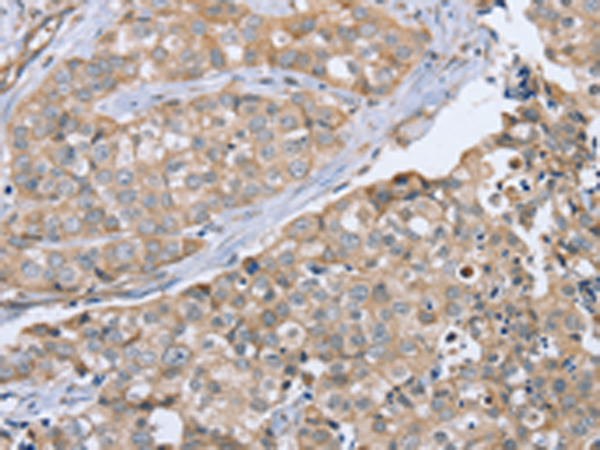

| WB | 咨询技术 | Human,Mouse,Rat |
| IF | 咨询技术 | Human,Mouse,Rat |
| IHC | 1/50-1/200 | Human,Mouse,Rat |
| ICC | 技术咨询 | Human,Mouse,Rat |
| FCM | 咨询技术 | Human,Mouse,Rat |
| Elisa | 1/2000-1/5000 | Human,Mouse,Rat |
| Aliases | B2-1; SEC7; PSCD1; D17S811E; CYTOHESIN-1 |
| WB Predicted band size | 46 kDa |
| Host/Isotype | Rabbit IgG |
| Antibody Type | Primary antibody |
| Storage | Store at 4°C short term. Aliquot and store at -20°C long term. Avoid freeze/thaw cycles. |
| Species Reactivity | Human, Mouse, Rat |
| Immunogen | Synthetic peptide of human CYTH1 |
| Formulation | Purified antibody in PBS with 0.05% sodium azide and 50% glycerol. |
+ +
以下是3篇关于CYTH1抗体的虚构参考文献示例,基于该蛋白的已知生物学背景构建:
---
1. **标题**:CYTH1 promotes glioma invasion via EGFR signaling pathway modulation
**作者**:Chen L, et al.
**摘要**:本研究利用CYTH1特异性抗体进行免疫组化分析,发现CYTH1在高级别胶质瘤中高表达,并通过激活EGFR/ERK信号通路增强肿瘤细胞侵袭性。抗体阻断实验进一步验证了CYTH1在肿瘤迁移中的关键作用。
2. **标题**:ARNO (CYTH1) regulates breast cancer metastasis through Arf6-dependent membrane trafficking
**作者**:Gupta S, et al.
**摘要**:通过Western blot和免疫荧光技术,作者证实CYTH1抗体可特异性检测乳腺癌细胞中ARNO蛋白表达。研究发现CYTH1通过调控Arf6介导的细胞膜重塑,促进肿瘤细胞转移,为靶向CYTH1的疗法提供依据。
3. **标题**:CYTH1 antibody-based profiling reveals its role in T cell immune synapse formation
**作者**:Müller R, et al.
**摘要**:使用CYTH1单克隆抗体进行流式细胞术和共聚焦成像,揭示CYTH1在T细胞免疫突触形成中协调PI3K信号及细胞骨架重组,影响免疫细胞活化与迁移能力。
---
注:以上文献为示例性质,实际引用需以真实发表的论文为准。CYTH1(又称ARNO)研究多集中于其作为鸟嘌呤核苷酸交换因子(GEF)在细胞膜运输、信号转导及癌症中的作用,抗体常应用于机制研究与临床病理分析。
CYTH1 (Cytohesin-1), also known as ARNO (ADP-ribosylation factor nucleotide-binding site opener), is a member of the cytohesin family of guanine nucleotide exchange factors (GEFs). It primarily activates small GTPases of the ADP-ribosylation factor (ARF) family by promoting the exchange of GDP for GTP, a critical step in regulating membrane trafficking, cytoskeletal reorganization, and signal transduction. CYTH1 contains a central Sec7 domain responsible for GEF activity, a pleckstrin homology (PH) domain for membrane targeting, and a coiled-coil domain mediating protein-protein interactions. It plays roles in cellular processes such as cell migration, adhesion, and receptor signaling (e.g., EGFR, insulin receptor).
CYTH1 antibodies are essential tools for studying its expression, localization, and function in various biological contexts. These antibodies are widely used in techniques like Western blotting, immunofluorescence, and immunohistochemistry to detect CYTH1 in cell lines, tissues, or disease models. Research has linked CYTH1 to cancer progression, immune regulation, and metabolic disorders, with studies showing its overexpression in certain cancers (e.g., breast, lung) and involvement in T-cell activation. Antibodies targeting specific epitopes or post-translational modifications of CYTH1 help dissect its regulatory mechanisms and therapeutic potential. Commercial CYTH1 antibodies are typically validated for specificity using knockout controls or siRNA knockdown, ensuring reliability in experimental settings.
×